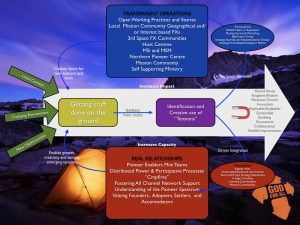Im reading a great book Utopia for realists and it made me ponder how often people mistake me for an idealist when Im often just a realist. Theres a great chapter on why we should give everyone free money, and the evidence that no strings attached giving lifts people out of poverty in amazing ways and really strong evidence for the universal basic minimum income. Yet how often do we (and I think very often in the church) struggle with new ways of doing things even though there is often overwhelming evidence that if you doing things differently good stuff happens. We are locked into certain patterns and behaviours, ideals and constructs, that mean we ignore new possibilities even when confronted with realism (often in terms of evidence based research) about what is currently going on or with realism (often in terms of evidence based research) about how different approaches work.
Too often it is idealism that makes people write off new ideas, its just too pie in the sky, and yet too often realism is mistaken for criticism, so little headway is made there either. I think I am often caught somewhere between the two, I dream of a better world and do what I can towards it. I read research and try to use evidence, experience and the Holy Spirit to feel my way forward, so can be told Im being critical. Any ideas?



